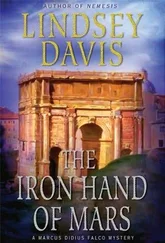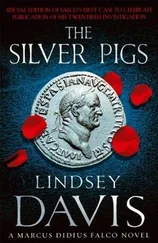Lindsey Davis - The Ides of April
Здесь есть возможность читать онлайн «Lindsey Davis - The Ides of April» весь текст электронной книги совершенно бесплатно (целиком полную версию без сокращений). В некоторых случаях можно слушать аудио, скачать через торрент в формате fb2 и присутствует краткое содержание. Год выпуска: 2013, ISBN: 2013, Издательство: Minotaur Books, Жанр: Исторический детектив, на английском языке. Описание произведения, (предисловие) а так же отзывы посетителей доступны на портале библиотеки ЛибКат.
- Название:The Ides of April
- Автор:
- Издательство:Minotaur Books
- Жанр:
- Год:2013
- ISBN:9781250023698
- Рейтинг книги:3 / 5. Голосов: 1
-
Избранное:Добавить в избранное
- Отзывы:
-
Ваша оценка:
- 60
- 1
- 2
- 3
- 4
- 5
The Ides of April: краткое содержание, описание и аннотация
Предлагаем к чтению аннотацию, описание, краткое содержание или предисловие (зависит от того, что написал сам автор книги «The Ides of April»). Если вы не нашли необходимую информацию о книге — напишите в комментариях, мы постараемся отыскать её.
The Ides of April — читать онлайн бесплатно полную книгу (весь текст) целиком
Ниже представлен текст книги, разбитый по страницам. Система сохранения места последней прочитанной страницы, позволяет с удобством читать онлайн бесплатно книгу «The Ides of April», без необходимости каждый раз заново искать на чём Вы остановились. Поставьте закладку, и сможете в любой момент перейти на страницу, на которой закончили чтение.
Интервал:
Закладка:
I went home. I stomped moodily up to my office, as if I wanted to distance myself from the crowds that way. It was not entirely successful, since noise rose between the narrow buildings and seemed amplified when it reached me. For the next few hours, even when I stayed indoors and refused to look out over the balcony, I was increasingly aware of large numbers of people moving about below. For the most part they were quiet so far. The festival involved sacrifice and solemn rites, with a deep religious purpose. And most had yet to find a hole they liked, in which to dig in for the evening and drink themselves silly.
In any case, there was the race. It was a big event. Horses and riders had been training for a long while. This was the first outing of the season; owners hoped their horses would become this season's famous winner. Jockeys, too, were eager for fame. Public gambling was illegal-yet big money rode on the outcome.
My local neighbourhood grew still as everyone flocked to the Circus. The bulk of the Aventine's main peak lay between Fountain Court and the Circus Maximus, muffling sound partially; yet when surrounding buildings lay quiet on great occasions, we could always make out the distant roar. It started with snatches of distant music as the religious procession entered through the ceremonial gates at the apsidal end further from us, passing under the new triple arches built in honour of the Emperor Titus. Then a slight surge of vocal approval might cover the arrival of our current emperor in his official box, though Domitian's new elaborate viewing platform, high on the edge of the Palatine in his grand palace, made him almost invisible to the crowd so far below.
On legal advice I retract that. People had supposedly been thrown to the arena beasts for insulting the emperor in his hearing at the Games. Writing about him critically was as bad.
There came a lull in the noise, which would be when white-robed women carried out mysterious rites for Ceres; those rites were reserved for female initiates, though one of Rome's cadre of senior priests, the Flamen Cerialis, would officiate in his cape and pronged headdress, while the plebeian aediles also had a traditional role in the prayers. This would be important for the ambitious Manlius Faustus. Aediles who managed the Games well and won the crowd's approval could later use their public support to help them gain more important positions. It was not easy to impress a Roman crowd. Indifferent to his glory, many in the predominantly male audience would be still gathering, talking among themselves and assessing their surroundings during this part of the proceedings. They had to endure the rites, but would be bored. You can't make bets on the sacrifice of a pregnant sow. Indeed, even for a suave audience of hard-nosed Romans who would gamble away their grandmothers, placing bets during this solemn moment is generally frowned upon. Their upright grandmas would have taught them that.
Next came a long, steady noise as the audience settled in their seats for the race, a steady hum that broke into a strident crescendo once the runners emerged. This outburst was always heard loud on the Aventine, because the twelve brightly painted starting gates stood at our end of the track. A burst of sound marked the moment when they opened. As the horses completed each circuit, the noise swelled. You could follow the progress of each lap, without needing to be there. You knew each time the leaders passed the turning points at the ends of the central barrier, that curious construction dividing the tracks that bore big marble eggs for counting laps, among dolphin statues, obelisks, refuges for assistants, small temples and shrines.
A race in the Circus was seven laps. The finish came with a full-throated roar that resonated even up here, through the unstable fabric of my building. The audience would have thrown themselves to their feet in ecstasy. Enormous gusts of garlic- and cabbage-laden farting would billow above the stadium, a ripe miasma that was barely contained by competing breath pastilles and hair pomades. The ovation for the winner would be the high spot of the jockey's life; even the exhausted horse would toss his head and enjoy the glory.
After the race finished, normally the many exits would empty the Circus in moments. Tonight, though, people would not leave. Tonight, they would wait in their seats for more entertainment. The snack-vendors would run up and down the steps handing out beakers and bundles of food for the peckish. Marshals would try to order people about, just to show they had that privilege. In a crowd of that size-it was estimated to be a quarter of a million, though boy cousins of mine once did the sums and claimed it was only two thirds of that-someone was bound to have fainted. Someone would have keeled over and not come round, exciting rumours that they had died. Nosy folk would crane their necks to gawp at the stretcher-bearers, until new lights flickered at one end of the stadium, where whoops and wild cries announced that the foxes had arrived.
I went downstairs, so any screams of pain and smells of burning flesh were less likely to reach me.
I tried not to imagine how the terrified, wriggling foxes would have been grabbed, grappled, fastened down and encumbered with the torches that were tied to their beautiful brushes. I tried to blot out thoughts of their agony, as flames were given to those torches, then as the foxes bounded free, men whistled and yelled, driving them away from the temple, running headlong down the lower slopes to the great valley of the Circus, headed off, herded in through the starting gates, shocked by the cruel uproar their arrival caused, and then subjected to slaughter amidst screams of delight from the crowd.
Then, only those of us with compassion in our souls understood it was a cause for shame. And every year I wondered, was not living decently supposed to be a gift to humans from the generous goddess Ceres?
XXXIII
Next morning was the thirteenth day of April, the Ides. It was a long day for me, and in due course I was to see that it was the pivotal point of my enquiries. It was also my birthday, although when I woke in the morning I had forgotten about that. When you live alone, all days are equal.
It began mundanely. A domestic day. I made life hell for the boy who swept the stairs, the water carrier, the lamp provider and Rodan. Supervision of lacklustre male staff is the traditional role of a Roman woman, in a business, on a farm, in the home. We hold the keys. We organise the rota. We know where to lay hands on equipment when it is needed. We keep things running smoothly, while the half-baked and the blatantly bone-idle mess about. Men are convinced they run the Empire. The Empire would collapse without us.
Throwing my weight around perked me up. I then changed the covers on my bed, sorted my wardrobe, tidied my jewellery box. I went to the baths, scrubbed myself harder than usual, layered on moisturising oils, let a girl arrange my hair exotically, invested in a manicure, let myself be lured into a pedicure as well, had some overdue depilatory work done, and slowly relaxed.
Prisca appeared. "I've heard all about those murders you're involved with!"
"Ah, word has got out now?"
"I'll say! When are you going to catch him?"
If I knew that, I thought glumly, I would be out putting a neck-collar on the bastard right now. The bathhouse owner did not want to hear me speaking reason. Public hysteria was now rife and according to Prisca there were hundreds of victims. For once, I felt a mild sympathy with Manlius Faustus for having wanted to keep this epidemic of deaths a secret.
The killer was a mad poet, I was curious to learn. He had a grudge against anyone born on Thursdays, whom he stabbed with specially made silver stilettos. Prisca had been told this nonsense by an ointment-seller on Lupin Street whose nephew worked in the tax office.
Читать дальшеИнтервал:
Закладка:
Похожие книги на «The Ides of April»
Представляем Вашему вниманию похожие книги на «The Ides of April» списком для выбора. Мы отобрали схожую по названию и смыслу литературу в надежде предоставить читателям больше вариантов отыскать новые, интересные, ещё непрочитанные произведения.
Обсуждение, отзывы о книге «The Ides of April» и просто собственные мнения читателей. Оставьте ваши комментарии, напишите, что Вы думаете о произведении, его смысле или главных героях. Укажите что конкретно понравилось, а что нет, и почему Вы так считаете.












